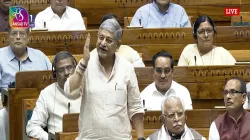Waqf Amendment Bill, 2024 is not against Muslims: JDU's Lalan Singh in Lok Sabha | WATCH
The Lok Sabha witnessed a fierce debate over the controversial Waqf Amendment Bill, 2024, which was tabled by Union Minister Kiren Rijiju in the Lower House.

Bharatiya Janata Party (BJP)'s ally Janta Dal (United) JD-U MP Rajiv Ranjan Singh also known as Lalan Singh supported the Waqf Amendment Bill, 2024, saying it would bring transparency in the Waqf board. While participating in the discussion on the bill in the Lok Sabha, he slammed the Opposition, saying the bill is not about a mosque or temple but a bid to bring transparency in an institution.
"How is it against Muslims? This law is being made to bring transparency. The opposition is comparing it with temples, they are diverting from the main issue. KC Venugopal (Congress) should explain how thousands of Sikhs were killed," Singh said.
Every institution should be functional in a transparent way, he added.
Targeting Congress, Singh said, the party must not talk about the minority's interest as it was involved in the killing of thousands of Punjabi Sikhs. "Who killed Indira Gandhi? Was a taxi driver responsible, why was he killed? We witnessed the anti-Sikh riots," the JD-U leader said counting Congress MPs who were raising slogans against the bill in the Lok Sabha.
What is Waqf (Amendment) Bill?
The bill which seeks to amend the law governing waqf boards has proposed far-reaching changes in the present Act, including ensuring the representation of Muslim women and non-Muslims in such bodies. The Waqf (Amendment) Bill also seeks to rename the Waqf Act, 1995, as the Unified Waqf Management, Empowerment, Efficiency and Development Act, 1995.
According to its statement of objects and reasons, the Bill seeks to omit Section 40 of the current law relating to the powers of the Board to decide if a property is waqf property. It provides for a broad-based composition of the Central Waqf Council and the State Waqf Boards and ensures the representation of Muslim women and non-Muslims in such bodies.
The Bill also proposes the establishment of a separate board of Auqaf for the Bohras and Aghakhanis. The draft law provides for the representation of Shias, Sunnis, Bohras, Agakhanis and other backward classes among Muslim communities.
(With PTI inputs)